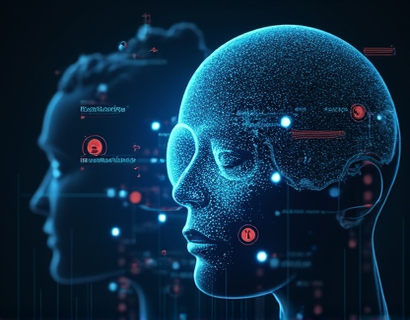AI and Crypto: Revolutionizing Digital Engagement in the Modern Ecosystem
The intersection of artificial intelligence (AI) and cryptocurrency is redefining the landscape of digital engagement. This synergy is not just a technological curiosity but a transformative force that is reshaping how businesses interact with users, drive growth, and maintain a competitive edge. As we delve into this topic, it's essential to understand the fundamental roles that AI and cryptocurrency play individually and how their convergence is creating advanced solutions that enhance user experiences.
Understanding AI in Digital Ecosystems
Artificial intelligence, a subset of computer science, focuses on creating systems that can perform tasks requiring human intelligence, such as learning, reasoning, and self-correction. In the context of digital ecosystems, AI serves as a powerful tool for analyzing vast amounts of data, identifying patterns, and making predictions. This capability is crucial for businesses aiming to deliver personalized and relevant experiences to their users.
One of the primary applications of AI in digital ecosystems is in user behavior analysis. By leveraging machine learning algorithms, companies can gain deep insights into user preferences, habits, and trends. This data-driven approach allows businesses to tailor their offerings, optimize content, and enhance user engagement. For instance, AI can analyze social media interactions, website traffic, and purchase history to create highly targeted marketing campaigns that resonate with specific user segments.
Cryptocurrency: A New Paradigm for Digital Transactions
Cryptocurrency, on the other hand, represents a decentralized and secure form of digital currency. Built on blockchain technology, cryptocurrencies like Bitcoin, Ethereum, and others offer a transparent and tamper-proof way to conduct transactions. This technology has the potential to revolutionize the way value is exchanged online, reducing reliance on traditional financial systems and enhancing privacy and security.
The adoption of cryptocurrency in digital ecosystems extends beyond mere transactional convenience. It provides a new layer of trust and transparency, which is particularly valuable in industries where data integrity and user trust are paramount. For example, in the realm of digital content and media, blockchain-based platforms can ensure that creators are fairly compensated for their work, while users can access content without intermediaries.
AI-Driven Personalization in Cryptocurrency Ecosystems
The combination of AI and cryptocurrency creates a powerful synergy that is particularly evident in personalized user experiences. AI algorithms can analyze user interactions with cryptocurrency platforms, such as trading activities, portfolio management, and community engagement. This analysis enables the delivery of customized recommendations, alerts, and insights that enhance the user's overall experience.
For instance, an AI-driven cryptocurrency portfolio manager can use machine learning to predict market trends and suggest optimal investment strategies based on a user's risk tolerance and financial goals. Similarly, a blockchain-based social network for crypto enthusiasts can use AI to curate content and connections that align with a user's interests and preferences, fostering a more engaging and relevant community.
Enhancing User Security Through AI and Cryptography
Security is a critical concern in both AI and cryptocurrency domains. The integration of AI in security protocols can significantly enhance the protection of user data and assets. AI-powered security systems can detect and respond to threats in real-time, using advanced analytics to identify anomalies and potential vulnerabilities.
In the context of cryptocurrency, AI can be used to strengthen blockchain security by identifying and mitigating risks associated with smart contracts and decentralized applications (dApps). For example, AI can analyze code for vulnerabilities and predict potential attack vectors, allowing developers to address issues proactively. Additionally, AI-driven identity verification systems can enhance the security of cryptocurrency transactions by ensuring that only authorized users access sensitive accounts.
Optimizing User Interactions with AI Chatbots
AI chatbots are becoming an indispensable tool for enhancing user interactions in digital ecosystems, including those built on cryptocurrency. These intelligent agents can provide 24/7 customer support, answer queries, and guide users through complex processes with ease. By leveraging natural language processing (NLP) and machine learning, chatbots can understand and respond to user requests in a human-like manner, improving the overall user experience.
In the cryptocurrency space, chatbots can assist users with tasks such as monitoring portfolio performance, executing trades, and accessing educational resources. For example, a chatbot integrated into a cryptocurrency exchange can help users navigate the platform, provide real-time market updates, and offer personalized investment advice, all while ensuring a seamless and secure interaction.
Data-Driven Decision Making with AI and Crypto
The convergence of AI and cryptocurrency enables businesses to make data-driven decisions that can significantly impact their success. By analyzing large datasets, AI can uncover hidden patterns and insights that traditional methods might miss. This capability is particularly valuable in the crypto market, where volatility and complexity require precise and timely decision-making.
For instance, AI can analyze historical price data, market sentiment, and macroeconomic indicators to forecast market trends and inform investment strategies. Similarly, businesses can use AI to optimize their marketing spend by identifying the most effective channels and messaging for their target audience. This data-driven approach not only enhances decision-making but also improves resource allocation and overall efficiency.
Building Trust Through Transparency and Traceability
Trust is a fundamental component of any digital ecosystem, and the combination of AI and cryptocurrency offers unique solutions to build and maintain trust. Blockchain's inherent transparency and immutability provide a tamper-proof record of transactions, which can be further enhanced by AI-driven auditing and verification processes.
AI can analyze blockchain data to ensure compliance with regulatory standards and detect any suspicious activities. This level of transparency reassures users that their transactions are secure and verifiable, fostering a greater sense of trust in the platform. Moreover, AI can help in creating transparent and fair governance models for decentralized applications, ensuring that all stakeholders have a voice and a stake in the decision-making process.
Scalability and Efficiency with AI and Blockchain
Scalability and efficiency are ongoing challenges in the digital ecosystem, and AI and cryptocurrency offer innovative solutions to address these issues. Blockchain technology, with its decentralized nature, can reduce the need for intermediaries and streamline processes, leading to faster and more cost-effective transactions.
AI can further enhance scalability by optimizing network performance and resource allocation. For example, AI algorithms can predict traffic patterns and adjust network resources accordingly, ensuring that the system remains responsive and efficient even during peak usage times. In the context of cryptocurrency, AI can optimize mining operations, reduce energy consumption, and improve the overall sustainability of blockchain networks.
Future Trends and Opportunities
The future of AI and cryptocurrency in digital ecosystems is promising, with numerous trends and opportunities on the horizon. One significant trend is the rise of decentralized finance (DeFi) platforms, which leverage blockchain and AI to provide financial services without traditional intermediaries. These platforms offer a range of services, from lending and borrowing to decentralized exchanges and yield farming, all powered by smart contracts and AI-driven analytics.
Another exciting development is the integration of AI with non-fungible tokens (NFTs) and other digital assets. AI can enhance the creation, management, and trading of NFTs by providing unique and personalized experiences for collectors and artists. For instance, AI-generated art and music are gaining popularity, offering new avenues for creativity and monetization.
Furthermore, the convergence of AI and cryptocurrency is paving the way for more sophisticated decentralized applications (dApps) that combine the strengths of both technologies. These dApps can offer secure, transparent, and user-centric services across various industries, from healthcare and finance to gaming and education.
As the technology continues to evolve, businesses and developers will have access to increasingly advanced tools and platforms that make it easier to harness the power of AI and cryptocurrency. This will democratize access to these technologies, enabling a broader range of players to innovate and compete in the digital ecosystem.
Conclusion
The integration of AI and cryptocurrency is revolutionizing digital engagement by providing advanced solutions that enhance user experiences, drive growth, and ensure security and transparency. By leveraging these technologies, businesses can stay ahead in the competitive tech landscape, deliver superior user experiences, and unlock new opportunities for innovation and expansion. As the ecosystem continues to evolve, the potential for AI and cryptocurrency to transform digital interactions is vast, making it an exciting and promising area for tech professionals and enthusiasts alike.











































